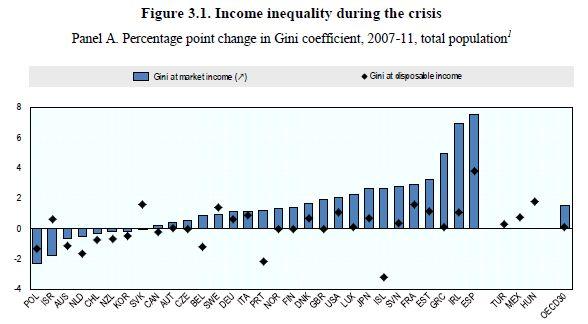THE ECO SCAN – An OECD report notes that income inequality has reached a record level since the 1980 crisis has contributed to their worsening
The inequalities have never been as important in the world and “the gap between rich and poor continues to widen.” The latest OECD report on inequality in the world said that the situation has never been so critical. “In most OECD countries, inequalities are now at their peak since data began to be collected,” that is to say, since the 1980s, the report said. What explains this increase?
• Unemployment has become the main factor income inequality
Before the crisis, wage inequality were the major component of inequality income. The issue was not then to have a job but to have a well-paid job. The crisis years between 2007 and 2011, have made a change in the factors behind rising inequality in the OECD countries. The massive unemployment caused by the fall in economic activity becomes the main source of inequality: income people without activity are well below those that work and the extent of contributing to the sharp rise in inequality.
At the same time, wage inequality continues to increase. On average, the Gini coefficient * (index measuring inequality) in OECD countries increased by 1.5% between 2007 and 2011. Even those who have jobs are affected by inequality.

OECD
• Public policies have changed lenses
At the beginning of the crisis, governments have tried to keep the tax rates to levels prevailing before the crisis to avoid aggravating inequalities and strengthened benefits for holding income inequality . But as the crisis progressed and public deficits worsened by skyrocketing national debt, governments have reviewed their priorities. Fiscal consolidation programs have taken precedence over social concerns: taxes and increased social benefits have been reduced for the sake of reducing public expenditure. Policies that previously helped to cushion the income inequality has suddenly worsened them.
• The most disadvantaged groups suffered most from the crisis
As the crisis would have helped to reduce inequalities by encouraging companies to revise downwards the highest wages, she instead hit hard the most disadvantaged groups. The low-income households have “more is lost during the crisis less benefited from the recovery than others” and says the OECD report. On average, the income of the poorest 10% has declined more than that of the richest 10%. This decrease was also earlier, speaking in 2008 while income from other households were affected only from 2009. For the OECD, this finding “is particularly worrying, since emphasizes a long-term trend.”
* The Gini coefficient is 0 in the case of perfect equality (everyone has the same income) and 1 in a position of extreme inequality (one person has all the income, others have nothing).
No comments:
Post a Comment